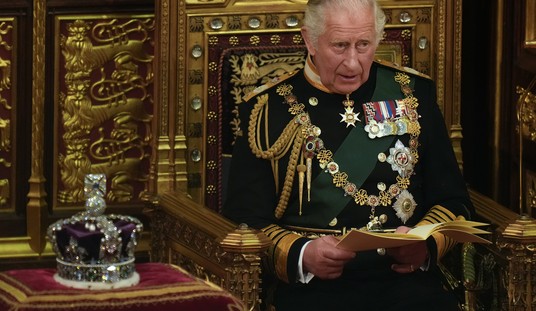Yesterday’s hearings on the Benghazi terrorist attack that left four Americans dead, including our Ambassador, provided a rather enlightening moment about the US broadcast media — when it should have been a belatedly enlightening moment for our broadcast media. The hearing produced several jaw-dropping highlights, including the State Department assertion post-attack that we “had the correct number of [security] assets in Benghazi,” a grotesque declaration after the sacking of the consulate. Diplomatic Security personnel had despaired of getting assistance from State (even while Austria kept its full security detail — and got a fleet of Chevy Volts, apparently), and felt that “the Taliban was inside the [State Dept] building.” Only the night before the hearing did State disavow their initial story on the attack being a “spontaneous protest” that “spun out of control,” which should have been a huge red flag to the broadcast networks that an administration cover story had completely fallen apart.
So how did the broadcast networks cover the story last night? Twitchy has the details:
http://twitter.com/#!/markknoller/status/256160285470117888
http://twitter.com/#!/markknoller/status/256160285470117888
http://twitter.com/#!/AG_Conservative/status/256171478435893250
That’s not to say that the media didn’t cover it at all. Dana Milbank, for instance, drilled down instantly to the real crux of the issue — the fact that Republicans are talking about CIA missions and spilling their secrets:
When House Republicans called a hearing in the middle of their long recess, you knew it would be something big, and indeed it was: They accidentally blew the CIA’s cover.
The purpose of Wednesday’s hearing of the Oversight and Government Reform Committee was to examine security lapses that led to the killing in Benghazi last month of the U.S. ambassador to Libya and three others. But in doing so, the lawmakers reminded us why “congressional intelligence” is an oxymoron.
Through their outbursts, cryptic language and boneheaded questioning of State Department officials, the committee members left little doubt that one of the two compounds at which the Americans were killed, described by the administration as a “consulate” and a nearby “annex,” was a CIA base. They did this, helpfully, in a televised public hearing.
Wow! None of us knew that … except those who read it in the New York Times on September 24th:
Among the more than two dozen American personnel evacuated from the city after the assault on the American mission and a nearby annex were about a dozen C.I.A. operatives and contractors, who played a crucial role in conducting surveillance and collecting information on an array of armed militant groups in and around the city.
“It’s a catastrophic intelligence loss,” said one American official who has served in Libya and who spoke on the condition of anonymity because the F.B.I. is still investigating the attack. “We got our eyes poked out.”
Since both posts got overrun and are to this day unsecured, and the CIA has evacuated its personnel from Benghazi, the business conducted at those facilities is not exactly a state secret any more. However, I can understand why Milbank may have been confused on this point. In the 17 days since the New York Times reported this, his own newspaper has managed to make just one mention of this — and that came from Jennifer Rubin, whom Milbank apparently doesn’t read.
In my column for The Fiscal Times today, I argue that whether or not the response to the security situation in Benghazi before and after the attack is incompetence or worse, it’s a major scandal that should be getting more attention from the national media:
In this case, it’s hard to argue that the cover-up is worse than the “crime” of incompetence that led up to it. After all, four people died in that attack, and perhaps even a higher level of security might not have prevented it. It has become clear, though, that the State Department didn’t recognize that Benghazi and its environs had become a nest of the very terrorists we now fight in places like Afghanistan, Somalia, Yemen, and other hot spots, and that this was no ordinary case for consular security. Instead of listening to people on the ground and acting to provide some kind of extraordinary security, the Benghazi mission was left to just “hope that everything would get better.”
On top of that, the administration at the very least allowed a false narrative to unfold about the nature of the attack – a narrative that had specific political benefits for President Obama. That might be coincidence, but that’s difficult to believe. At the very least, it shows a remarkable level of incompetence to send the UN Ambassador to five Sunday talk shows five days later to push the false “spontaneous protest” narrative when the White House itself had designated it a terrorist attack within the first 24 hours.
At worst, this looks like a political cover-up intended to disguise the fact that Obama’s policy in Libya has given al-Qaeda a fresh launch and another safe haven for its operations against the US.
Either way, this requires immediate and thorough scrutiny, from Congress and the national media. That may make some journalists uncomfortable in an election season, but we need to know the truth about national and diplomatic security – so that we don’t have even more dead Americans and further cover-ups about the circumstances of their deaths.
At one time, journalists and broadcast networks considered it their mission to hold government accountable. These days, they seem at least as comfortable with covering up the news as with covering it.
Update: Coincidentally, PJ Media is announcing their Duranty Prize winner today. They’re going to need a lot more statuettes next year, I think.








Join the conversation as a VIP Member